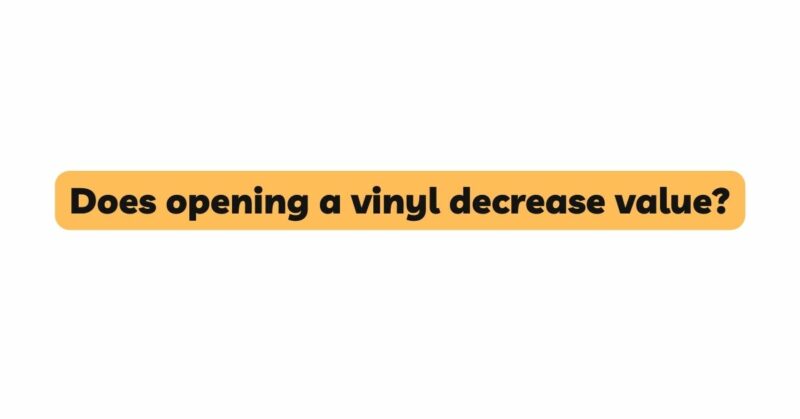In the resurgent world of vinyl records, where nostalgia meets audio fidelity, collectors and enthusiasts often find themselves entangled in debates over the intrinsic value of these analog treasures. One of the most persistent debates centers around the effect of opening a vinyl record on its monetary worth. Does the simple act of unsealing a record’s cover lead to a depreciation in value? This article delves into the nuances of this age-old question, exploring factors that influence the perceived value of opened vinyl records and shedding light on whether the notion holds true in today’s dynamic vinyl market.
The Sentimental Significance of Vinyl: Vinyl records evoke a sense of nostalgia and a connection to music history that few other formats can replicate. The crackling sound, tactile experience, and large album artwork contribute to the unique charm of vinyl records. Collectors and enthusiasts alike are drawn to vinyl not only for its sonic qualities but also for the emotional connection it provides to the past. In this context, the idea that opening a vinyl record could potentially diminish its value is rooted in both practical considerations and sentimental beliefs.
Factors Influencing Perceived Value:
1. Condition: The condition of a vinyl record plays a pivotal role in determining its value. While an unopened, sealed record might initially appear to be in pristine condition, it doesn’t necessarily guarantee better long-term preservation. Vinyl records are susceptible to damage from factors such as temperature fluctuations, humidity, and improper storage. Conversely, an opened record that has been well-cared-for, cleaned, and stored correctly can maintain its value and even appreciate over time.
2. Collectibility: Collectors are a diverse group, each with their own motivations and preferences. For some, owning an unopened vinyl record embodies the excitement of owning a piece of untouched history. This sense of novelty and rarity can contribute to the perceived collectibility of unopened records. However, for other collectors, the joy comes from experiencing the music and the tactile interaction with the vinyl itself. An opened record that has been lovingly played and appreciated can carry its own value based on the memories and experiences associated with it.
3. Rarity and Scarcity: The scarcity of a particular vinyl release can heavily influence its market value. Unopened records from limited pressings or special editions can indeed command higher prices due to their rarity. However, the value of an opened record is not solely tied to scarcity. Certain editions that were opened, played, and enjoyed by their owners might have a unique historical significance or sentimental value that cannot be replicated by an unopened copy.
4. Historical Context and Demand: The historical context and demand for a specific vinyl release can sway its value. Iconic albums, groundbreaking artists, or albums that mark cultural milestones can be highly sought after regardless of whether they are sealed or opened. The demand for these records is often driven by their impact on music history and the enduring appreciation they receive from enthusiasts.
Dispelling the Myth:
1. Sound Quality: One of the most common misconceptions is that opening a vinyl record inherently degrades its sound quality. In reality, the act of opening a record does not directly impact its audio fidelity. The quality of sound is determined by factors such as the pressing quality, mastering, and the playback equipment used. A well-maintained opened record can provide an exceptional listening experience, dispelling the notion that unopened records are the sole gateway to high-quality sound.
2. Personal Enjoyment: Vinyl records are meant to be enjoyed. The ultimate purpose of owning a vinyl record is to engage with the music and immerse oneself in its sonic landscape. While unopened records might hold a certain allure for collectors, the real value of a vinyl record lies in the personal enjoyment and connection it brings to its owner.
Conclusion: The belief that opening a vinyl record inherently decreases its value is a complex notion that depends on a variety of factors, including condition, rarity, collectibility, demand, and individual preferences. While unopened records can carry a sense of novelty and rarity, opened records also hold value through the experiences and connections they facilitate. In the end, the perceived value of a vinyl record is a subjective matter, influenced by the motivations of collectors, the historical context of the release, and the sentimental attachments associated with the music.
As the vinyl revival continues to flourish, it’s important to recognize that the world of collecting is not solely defined by monetary value. The joy of owning, playing, and experiencing vinyl records is a journey that encompasses both the tangible and intangible aspects of music appreciation. Whether a record is opened or sealed, its true worth lies in the memories, emotions, and stories it carries for its owner, making each vinyl record a unique and cherished artifact in the tapestry of music history.


